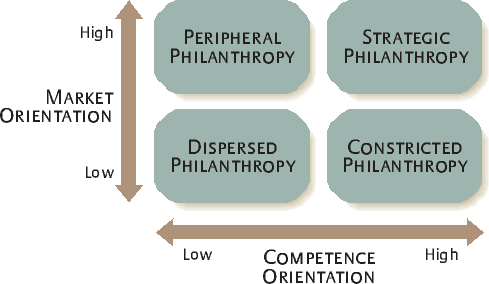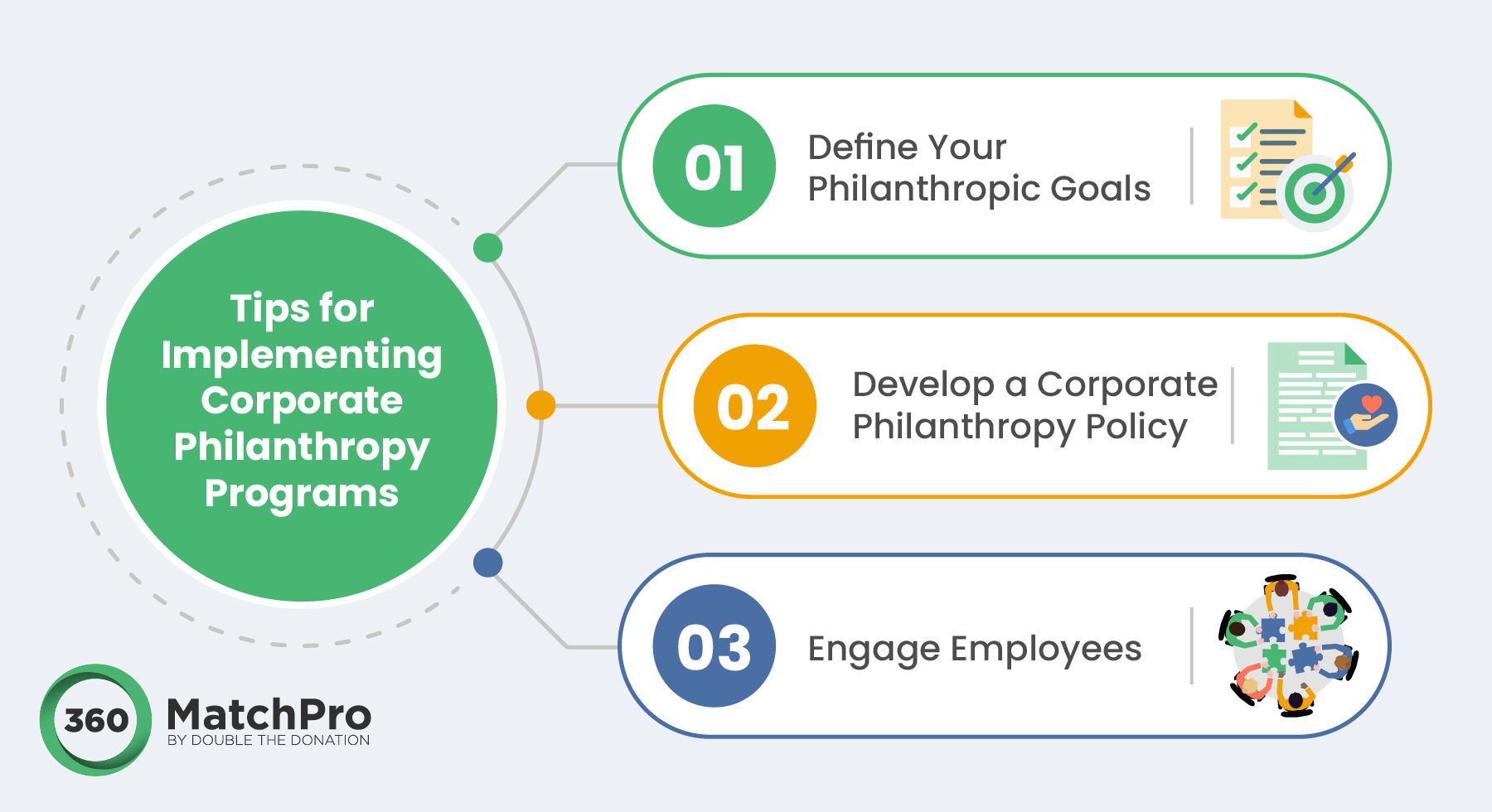Tracking ROI of your corporate philanthropy strategy
Discovering Exactly How Company Philanthropy Shapes Brand Online Reputation and Customer Loyalty
Corporate philanthropy greatly affects brand reputation and customer commitment. Business that take part in authentic philanthropic campaigns often see a positive shift in exactly how customers view them. This positioning of worths cultivates depend on and emotional connections with target markets. The efficiency of these kind initiatives can differ substantially. Understanding what really resonates with consumers is crucial for brand names looking for to improve their social effect and market position. What techniques will become vital for future success?
The Advancement of Corporate Philanthropy
As companies progressively recognize their duty in society, the advancement of business philanthropy has actually transformed from simple philanthropic donations to a tactical part of brand identification. At first, business took part in philanthropy mostly for tax obligation benefits or to improve their public photo. Gradually, this strategy shifted as stakeholders-- including consumers, financiers, and workers-- demanded an extra authentic dedication to social duty.
Organizations started aligning their kind efforts with their core worths and business objectives, leading to more impactful and thoughtful payments. This adjustment has actually urged firms to spend in sustainable practices and area advancement, promoting a sense of purpose that reverberates with customers.
Technical advancements have actually assisted in transparency and engagement, permitting organizations to display their humanitarian efforts much more efficiently. As a result, corporate philanthropy has actually arised as an indispensable part of business method, with organizations embracing the possibility to favorably influence culture while improving their total brand name narrative.
The Impact of Philanthropy on Brand Name Understanding
While firms take part in philanthropic efforts to promote social good, these efforts significantly form brand assumption among customers. Corporate philanthropy can boost a brand's picture by connecting it with positive social influence and community involvement. Customers typically regard brands that actively take part in philanthropic tasks as even more trustworthy and accountable. This assumption can influence acquiring choices, as consumers may favor brands that show a dedication to social issues.

Structure Emotional Connections Through Providing
Business philanthropy functions as an effective tool for improving brand identity by linking business worths with area demands. Via tactical providing, firms can cultivate area interaction and develop common worths that reverberate with consumers on an emotional level. This method not only enhances brand credibility however likewise builds long lasting connections between companies and their stakeholders.
Enhancing Brand Identity
They not just add to social great but also build much deeper emotional links with their target markets when business engage in philanthropic initiatives. By straightening their brand with philanthropic reasons, firms enhance their identification and signal worths that resonate with consumers. This placement produces a narrative that surpasses services and products, inviting clients to join a common objective. As consumers significantly focus on purpose-driven brands, firms that actively involve in providing can distinguish themselves in a crowded market. Such campaigns cultivate a feeling of commitment amongst consumers that really feel personally connected to the brand's values. Ultimately, business philanthropy becomes an essential device for enhancing brand name identity, cultivating long-term connections based upon shared ideas and emotional interaction.
Fostering Community Interaction
Countless research studies suggest that firms participating in community-focused kind initiatives can markedly enhance psychological connections with their stakeholders. By buying neighborhood projects and supporting social reasons, companies grow a feeling of belonging and trust within the neighborhood. This involvement promotes a favorable brand name image, as clients value firms that demonstrate authentic concern for societal concerns. Staff members often feel much more happy and inspired to be connected with a company that focuses on area welfare. As an outcome, consumers are more most likely to create commitment in the direction of brand names that proactively add to significant reasons. Eventually, cultivating area involvement via philanthropy not just boosts brand name online reputation yet likewise constructs long-term psychological connections that benefit both the firm and the area it serves.
Creating Shared Values
Just how can organizations properly develop common values that resonate with their stakeholders? Companies can achieve this by straightening their kind initiatives with their core objective and the interests of their communities. By participating in campaigns that attend to regional needs, businesses cultivate psychological connections with consumers, boosting brand name loyalty. For example, partnering with non-profits that mirror shared worths strengthens the brand name's picture and demonstrates dedication to social obligation. Furthermore, transparent interaction about these initiatives enables stakeholders to see the tangible influence of their contributions. Inevitably, by integrating common values right into their business philanthropy, firms not just improve their online reputations however also grow lasting partnerships with customers, leading to boosted loyalty and depend on. This alignment is crucial in contemporary customer decision-making.
Case Researches: Successful Philanthropic Campaigns
Examining successful humanitarian projects reveals numerous methods that improve brand name credibility. Impactful area initiatives, cutting-edge collaboration models, and lasting engagement techniques have actually proven reliable in fostering positive links with customers. These study highlight the value of thoughtful corporate giving up accomplishing both social and business goals.
Impactful Neighborhood Initiatives
Several companies have successfully leveraged humanitarian projects to boost their brand name reputation while making a significant influence in their neighborhoods. As an example, a technology firm launched a digital literacy program in underserved communities, supplying training and resources that equipped neighborhood homeowners. This initiative not only added to community development but also positioned the company as a socially responsible leader. Similarly, a significant food firm applied a cravings alleviation project, partnering with local nonprofits to distribute dishes to households in requirement. This initiative enhanced neighborhood ties and fostered consumer commitment. With these impactful initiatives, firms have actually demonstrated their commitment to social duty, properly straightening their brand worths with the requirements of the communities they offer, eventually enhancing their overall credibility.
Innovative Collaboration Designs
The success of impactful community campaigns commonly depends upon innovative collaboration models that combine varied stakeholders to deal with facility social difficulties. look at this website Case researches show just how companies, non-profits, and federal government entities can work together efficiently. For instance, an international company partnered with a local charitable to launch an education and learning program, merging resources and competence to enhance area literacy prices. An additional example included a technology company and a healthcare company signing up with pressures to develop a telemedicine option for underserved populaces. These partnerships not only intensified the reach of philanthropic efforts however likewise enhanced the brands' track records by straightening their missions with community requirements. Inevitably, cutting-edge collaboration versions serve as a catalyst for significant modification and foster more powerful links in between brands and their consumers.
Lasting Interaction Strategies

Gauging the ROI of Business Social Obligation
As companies significantly purchase business social responsibility (CSR) campaigns, comprehending the return on investment (ROI) associated with these initiatives becomes important. Gauging ROI in CSR is diverse, often including both qualitative and quantitative metrics. Economic returns can be evaluated via boosted sales, enhanced brand name loyalty, and boosted worker morale, which can cause greater performance. Additionally, firms might evaluate expense savings connected to lasting methods, such as decreased waste or energy consumption.
Qualitatively, the effect of CSR on brand credibility can be assessed through customer perception researches and social networks belief evaluation. Surveys can give insights right into just how CSR activities influence consumer commitment and depend on. Benchmarking versus sector standards can help companies evaluate their CSR effectiveness - corporate philanthropy. Eventually, a thorough strategy to measuring ROI allows companies to make informed choices about future CSR investments, lining up strategies with both monetary look at this site performance and social impact
Consumer Assumptions and Business Responsibility
Increasingly, consumers anticipate companies to operate with a solid sense of corporate responsibility, seeing honest practices as a requirement for brand loyalty. This shift in assumption reflects an expanding understanding of environmental and social problems, leading consumers to favor brand names that line up with their worths. Customers are extra inclined to sustain companies that involve in transparent methods, demonstrate sustainability, and add favorably to their communities.
Furthermore, social media amplifies these assumptions, permitting consumers to share their viewpoints and experiences rapidly. Brand names that fail to meet these moral requirements run the risk of reaction, while those that accept company duty frequently take pleasure in improved online reputation and consumer commitment. As customers require Related Site responsibility, firms must integrate corporate social responsibility right into their core approaches, focusing on moral actions not simply as an advertising and marketing approach, however as a basic facet of their procedures. This positioning can eventually result in stronger brand name fondness and sustained success in competitive markets.
Future Trends in Corporate Philanthropy and Brand Name Commitment
The landscape of company philanthropy is developing, influenced by the heightened customer assumptions surrounding corporate duty. Business are progressively integrating social impact right into their core service techniques, not merely as a secondary activity. Future patterns indicate a change towards openness, with brands sharing thorough info about their kind efforts and their straight impacts on communities.
In addition, modern technology is playing an important role, making it possible for real-time interaction in between consumers and brand names. Social media site platforms assist in direct communication, allowing consumers to voice their expectations and hold brand names accountable. Furthermore, more youthful generations, particularly Millennials and Gen Z, focus on sustainability and moral practices, driving organizations to adopt more diligent approaches.
As corporate philanthropy ends up being identified with brand identity, business that authentically straighten their goals with societal demands are most likely to foster stronger client loyalty. This merging of worths will eventually form the future of company reputation and consumer connections in a significantly diligent industry.
Regularly Asked Questions
How Do Consumers Discover a Firm's Philanthropic Initiatives?
Customers uncover a firm's philanthropic initiatives via numerous networks, consisting of social networks, news release, area occasions, and word-of-mouth. These methods promote recognition, making it possible for people to involve with brands that align with their passions and values.
What Duty Does Staff Member Participation Play in Corporate Philanthropy?
Worker involvement in corporate philanthropy boosts involvement, promotes a sense of possession, and enhances group cohesion - corporate philanthropy. This engagement typically magnifies the effect of charitable campaigns, bring about higher understanding and support for the firm's humanitarian efforts
Can Corporate Philanthropy Backfire on a Brand name's Track record?
Business philanthropy can indeed backfire on a brand name's credibility if perceived as opportunistic or insincere. Unfavorable public perception may arise, causing diminished trust fund and loyalty amongst consumers that prioritize credibility in corporate actions.
Are Smaller Sized Companies as Efficient in Philanthropy as Larger Corporations?
Smaller firms can be similarly reliable in philanthropy as larger companies, often demonstrating dexterity and authenticity. Their localized initiatives might resonate much more deeply with areas, promoting genuine connections regardless of limited resources compared to their bigger equivalents.
How Can Business Select the Right Creates to Support?
Companies can choose the ideal bring on by aligning their values with community requirements, assessing stakeholder interests, and assessing prospective influence. This calculated strategy fosters authenticity, improves interaction, and reinforces connections with customers and the broader community.
While firms engage in philanthropic initiatives to promote social good, these efforts considerably form brand name assumption amongst customers. As customers significantly focus on purpose-driven brand names, business that actively engage in giving can differentiate themselves in a crowded market. Many business have effectively leveraged humanitarian campaigns to enhance their brand name online reputation while making a purposeful influence in their neighborhoods. Progressively, consumers anticipate companies to run with a solid sense of corporate obligation, checking out ethical practices as a requirement for brand loyalty. As corporate philanthropy becomes identified with brand identity, firms that authentically align their missions with social requirements are likely to promote stronger customer commitment.